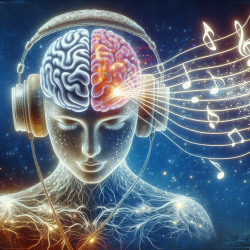Introduction
Traumatic brain injury (TBI) is a significant public health concern, leading to long-term cognitive deficits, particularly in executive function (EF). Recent research highlights the potential of music-based neurological rehabilitation (MBNR) to improve EF and induce neuroplasticity in TBI patients. This blog explores the findings from a groundbreaking study and provides insights for practitioners to enhance their therapeutic approaches.
The Study: A Groundbreaking Approach
The study, conducted by Martínez-Molina et al., involved a 10-week MBNR protocol administered to 40 patients with moderate-to-severe TBI. The research utilized neuropsychological testing and structural/functional magnetic resonance imaging to assess the impact of MBNR on EF and brain morphology. The findings revealed significant improvements in EF, particularly in set shifting, and therapy-induced gray matter volume changes in the right inferior frontal gyrus.
Key Findings
- Executive Function Improvement: MBNR led to significant enhancements in EF, with improvements maintained long-term.
- Neuroplasticity: Gray matter volume changes were observed, particularly in the right inferior frontal gyrus, correlating with better set shifting outcomes.
- Functional Connectivity: Changes in resting-state network connectivity were noted, indicating MBNR's role in inducing neuroplasticity.
Implications for Practitioners
For practitioners, these findings underscore the importance of incorporating music-based interventions into rehabilitation programs for TBI patients. The study suggests that MBNR can be a powerful tool for enhancing cognitive recovery and promoting neuroplasticity. Here are some ways practitioners can leverage these insights:
- Integrate Music Therapy: Consider incorporating music therapy sessions focusing on rhythmical training, structured cognitive-motor training, and assisted music playing.
- Monitor Progress: Use neuropsychological assessments and imaging techniques to track improvements in EF and brain morphology.
- Customize Interventions: Tailor music therapy sessions to individual patient needs, focusing on their specific cognitive deficits and preferences.
Encouraging Further Research
While the study provides compelling evidence for the efficacy of MBNR, further research is essential to explore its full potential. Practitioners are encouraged to contribute to this growing body of knowledge by conducting their own studies and sharing findings with the broader community. Collaborative efforts can lead to the development of standardized protocols and best practices for music-based rehabilitation in TBI patients.
Conclusion
Music-based neurological rehabilitation offers a promising avenue for enhancing cognitive recovery in TBI patients. By integrating MBNR into therapeutic practices, practitioners can help patients achieve better outcomes and improve their quality of life. For those interested in delving deeper into the research, the original study provides a comprehensive overview of the methodology and findings.
To read the original research paper, please follow this link: Cognitive efficacy and neural mechanisms of music-based neurological rehabilitation for traumatic brain injury.










